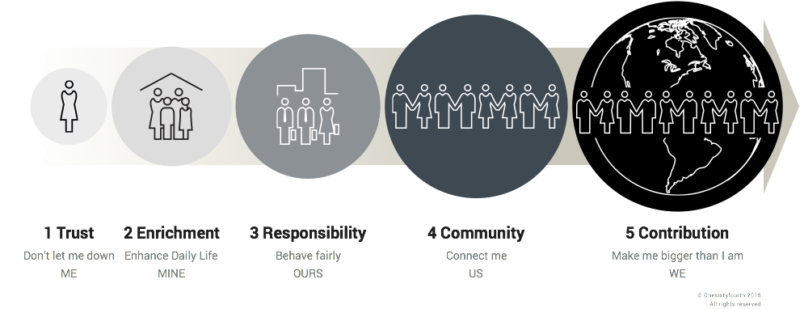How to Embrace Brand Citizenship for Purpose and Profit
By: Elaine Fogel

Any-sized business can practice social good. Yet, “businesses have traditionally looked to customers and employees to advocate for their brands. Today, the equation has flipped. More and more, customers and employees demand that brands advocate on their behalf, for the things that matter most to them.”
Anne Bahr Thompson, the author of Do Good: Embracing Brand Citizenship to Fuel Both Purpose and Profit, has been inspiring business leaders to use their brands as a motivating force for change for many years. With more than 25 years’ experience as a global brand strategist, she is an accomplished researcher, writer and speaker, and the pioneer of the strategic framework of Brand Citizenship®.
I recently had the opportunity to interview Anne about Brand Citizenship:
Q: What is brand citizenship?
Brand Citizenship® is proprietary five-step process that aligns purpose and profit that provide solutions to customers’ and employees’ personal ME needs and their generalized WE worries about the economy, the problems in the world, and the planet.
It is a way of doing business—from a company’s core purpose; to its delivery of goods and services; to its responsibility to its employees, community, the environment, and the world—that creates a sense of partnership and belonging, all with the aim of earning profits that are maintainable over the long term.
Q: How do both B2C and B2B businesses benefit from adopting it?
The 5 steps of Brand Citizenship are just as relevant to a company’s relationship with its employees and suppliers as they are to its customers. Brand Citizenship is a holistic principle that equips businesses, regardless of whether they are B2B or B2C, to gain lasting credit for sustainability and corporate social responsibility initiatives. The goal of doing good and becoming a sustainable business is a practical and necessary investment no matter who your target audience is.
Q: What is the brand citizenship model you recommend?
The five steps of Brand Citizenship logically flow from one another:
- TRUST: DON’T LET ME DOWN
First and foremost, brands that deliver on their promises are trusted more. Digital communications and information channels have made reciprocity one of five key requirements for trusted brands.
- ENRICHMENT: ENHANCE DAILY LIFE
People identify more with—and are less price sensitive toward—brands that help them to simplify their routines, make mundane tasks less dull, and enrich their daily lives.
- RESPONSIBILITY: BEHAVE FAIRLY
In a post-recession, flattened, and transparent world, customers expect brands to treat their employees fairly, behave ethically, and be proactive in their business practices.
- COMMUNITY:CONNECT ME
Brands that rally communities, motivate behavioral changes and fix social problems – provided they are not overtly political – attract more loyalists.
- CONTRIBUTION: MAKE ME BIGGER THAN I AM
Brands that play an active role in creating a more positive and life-enhancing future enrich loyalists’ lives by improving life on the planet.
Q: What can employees and managers do to get their companies involved in brand citizenship?
Today most employers have mechanisms for feedback. Some are better than others but people should use whatever internal mechanisms exist in their companies to speak out about the things that matter to them. Read your company’s sustainability report, follow your company on social media, get involved with the volunteer activities, ask questions in town halls, post questions to your CEO on a blog, have an on-going dialog with your manager and/or HR rep.
Brand Citizenship is not a one-time event or a box to check on a to-do list. Like the process of change itself, the five steps of Brand Citizenship are not prescriptive. Rather, they frame a journey that by necessity must adapt with the shifting cultural landscape. Brand Citizenship is an on-going journey that requires collaboration, co-creation, and constant rethinking—and potentially reconfiguring—business practices.
I’ll add one thing: your business needn’t be large to practice brand citizenship.
***
“Whether your company is a sole proprietorship or has employees, it has much to gain by engaging in responsible business practices and getting involved in its local, regional, or national community. Not only is it beneficial for your business survival and brand, it’s also good for your soul.” (From my book, Beyond Your Logo: 7 Brand Ideas That Matter Most For Small Business Success)












